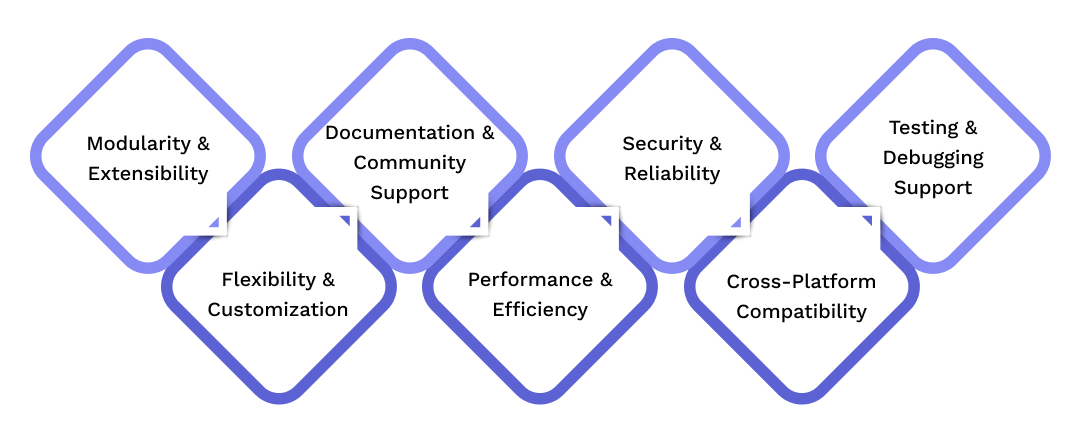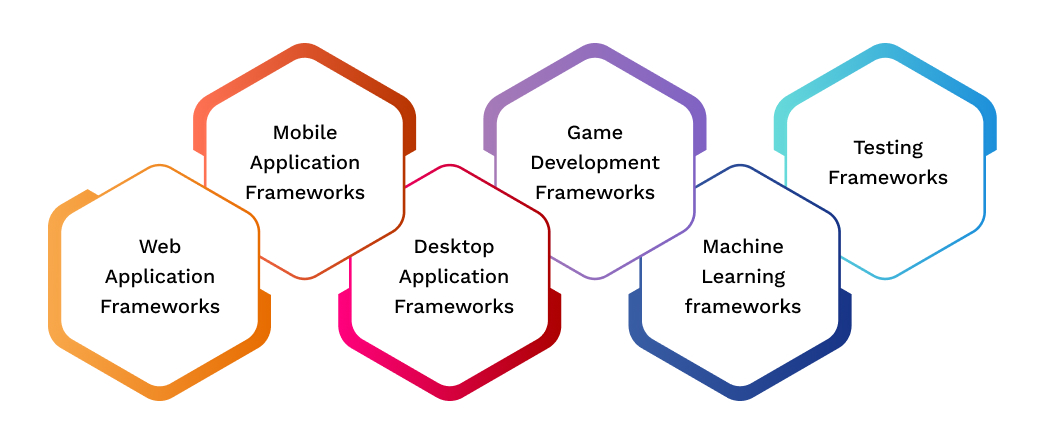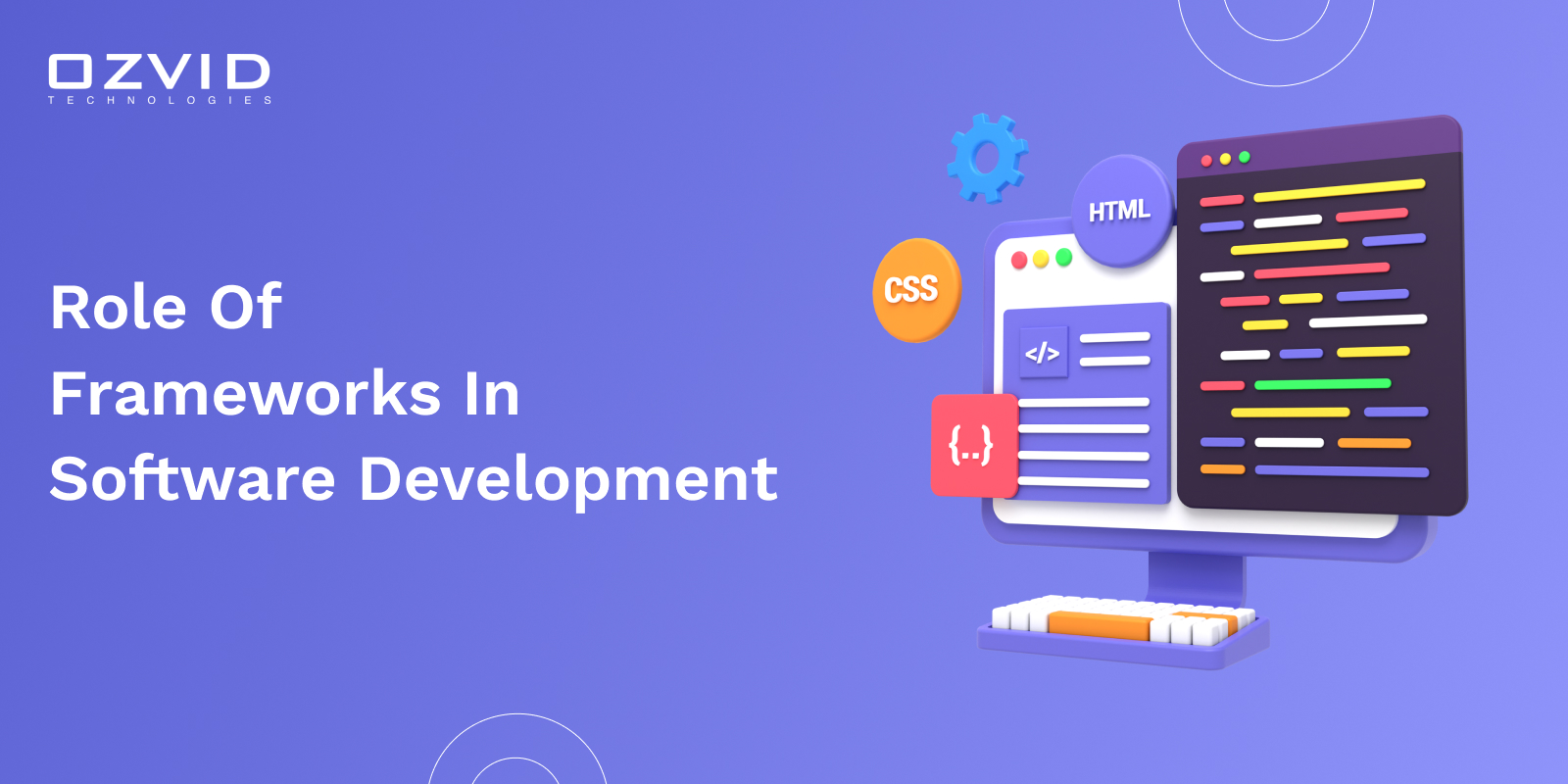In the programming world, a framework is vital to any development process. A framework is considered the foundation of software development. It is a collection of tools and libraries that offers a structured and organized approach to building software applications.
Frameworks make the development process more efficient and effective by simplifying the developer's tasks. It offers guidelines and best practices that developers can follow during development.
Features of a Good Framework
Frameworks play a crucial role in simplifying and accelerating the development process. However, not all frameworks are created equal. There are numerous frameworks available, but developers can only use the ones they need as per their requirements. Let us dive deep into the key features that define a good framework.

Modularity and Extensibility: A good framework must be modular and extensible. A modular framework allows developers to break down complex applications into smaller, manageable components or modules. Additionally, an extensible framework enables developers to easily add or remove functionalities as per their project requirements without affecting the core structure.
Flexibility and Customization: A robust framework should offer developers flexibility and customization features. It should not impose rigid constraints that hinder creativity or limit the range of possible solutions. Instead, it should provide customization options that allow developers to tailor the framework to suit their project requirements. This flexibility empowers developers to create unique and innovative applications.
Documentation and Community Support: Comprehensive documentation is essential to any good framework. Clear and well-structured documentation helps developers understand how to use the framework effectively. It saves them valuable time and effort when learning. Additionally, a strong community surrounding the framework is invaluable. A strong community provides support through forums, tutorials, and online resources. It enables developers to seek guidance, share knowledge, and collaborate with others who have experience using the same framework.
Performance and Efficiency: Efficiency is critical in any software development project. A good framework should be designed with performance in mind, handling the demands of modern applications. It should optimize resource usage, minimize overhead, and provide efficient algorithms and data structures. A well-performing framework enhances the user experience and contributes to the success of the application.
Security and Reliability: Security is one of the biggest concerns in today's digital world. A good framework should prioritize security measures and provide developers with tools and best practices to build secure applications. It should offer features such as input validation, encryption, authentication, and authorization mechanisms to safeguard against common vulnerabilities. Furthermore, a reliable framework should have a robust error-handling system, allowing developers to identify and resolve issues promptly.
Cross-Platform Compatibility: Cross-platform compatibility has become crucial with the development of various devices and operating systems. A good framework should support multiple platforms, enabling developers to build applications that run seamlessly across different devices and operating systems.
Testing and Debugging Support: A good framework should provide comprehensive testing and debugging support to ensure the quality of the developed applications. It should offer tools for unit testing, integration testing, and debugging, allowing developers to identify and fix issues efficiently. Robust testing capabilities help deliver reliable software with fewer bugs and improve the overall development process.
Challenges While Using A Software Framework
Even though a software framework can provide numerous benefits to developers, like any tool or technology, it also comes with its own set of challenges. These challenges can differ depending on the specific framework, the project requirements, and the experience level of the development team. Let us explore some common challenges developers face while using a software framework.

Learning Curve: One of the initial challenges when using a software framework is the learning curve. Frameworks often have their own unique syntax, conventions, and architectural patterns that developers need to understand and adapt to. This learning curve can be difficult for developers who are new to the framework or have limited experience. To overcome this challenge, developers need to invest time in learning the framework's documentation, tutorials, and best practices. They may also need to seek help from experienced developers or participate in online communities dedicated to the specific framework. Additionally, some frameworks offer training programs or workshops, which help developers get up to speed quickly.
Limited Flexibility: While software frameworks provide a structured approach to development, they can sometimes limit flexibility compared to building an application from scratch. Frameworks often come with predefined structures that may not align perfectly with the specific requirements of a project. It can lead to situations where developers need to work around the limitations imposed by the framework or make compromises in their implementation.
To overcome this challenge, developers should thoroughly evaluate the suitability of a framework for their project before committing to it. They should consider various factors, including project complexity, scalability requirements, and customization needs. Moreover, it is also crucial to choose a framework that allows for extension and customization through plugins or modules.
Debugging and Troubleshooting: When using a software framework, debugging and troubleshooting can be more challenging compared to traditional development approaches. However, frameworks may have debugging tools and error-handling mechanisms that developers must learn and utilize effectively. To resolve this challenge, developers should learn debugging and troubleshooting tools provided by the framework. They should also take advantage of the framework's community and resources to seek help when encountering issues.
Performance Overhead: Software frameworks typically introduce an additional layer of abstraction between
the application code and the underlying system. This abstraction can sometimes result in a performance overhead compared to writing code without a framework. The overhead can manifest in various ways, such as increased memory usage, slower execution speed, or additional network requests. To mitigate performance overhead, developers should carefully analyze the requirements of their project and evaluate the performance implications of using a particular framework. They should also optimize their code within the constraints of the framework by following best practices and utilizing performance profiling tools.
Even though software frameworks offer numerous advantages in terms of productivity and code reusability, they also present challenges that developers need to overcome. These challenges include the learning curve associated with a new framework, limited flexibility compared to building from scratch, debugging and troubleshooting complexities, performance overhead, and the potential for vendor lock-in. By understanding these challenges and adopting best practices, developers can effectively leverage software frameworks to build robust and scalable applications.
Types of Programming Framework
Programming frameworks are also called software frameworks. They provide developers with a structured way to build applications. There are numerous programming frameworks available, each designed for specific purposes. Let us discuss some of the most popular types of programming frameworks.

Web Application Frameworks: Web application frameworks are designed to facilitate the development of web applications. These frameworks provide a structure for building dynamic websites, handling HTTP requests and responses, managing databases, and implementing security measures. One widely used web application framework is Ruby on Rails, (also known as Rails). It is written in Ruby and follows the MVC pattern. Rails provide a large collection of libraries and conventions that simplify web development tasks.
Another popular web application framework is Django, written in Python. Django offers features like an ORM (Object-Relational Mapping) layer for database management and an admin interface for easy content management.
Mobile Application Frameworks: Mobile application frameworks are designed to streamline the development of mobile apps for various platforms including iOS and Android. These frameworks provide tools and libraries that enable developers to write code once and deploy it on multiple platforms. One prominent mobile application framework is React Native, developed by Facebook. React Native allows developers to build native mobile apps using JavaScript and React, a popular JavaScript library for building user interfaces. Another notable mobile application framework is Flutter, developed by Google. Flutter uses Dart as its programming language and provides a set of pre-built UI components.
Desktop Application Frameworks: Desktop application frameworks create applications that run on desktop operating systems like Windows, macOS, and Linux. These frameworks provide a set of tools and libraries for building user interfaces, handling system events, and accessing native APIs. One widely used desktop application framework is Electron, developed by GitHub. Electron allows developers to build cross-platform desktop apps using web technologies such as HTML, CSS, and JavaScript.
Another popular framework is JavaFX, which is part of the Java Development Kit (JDK). JavaFX provides a rich set of UI controls and supports multimedia, 3D graphics, and animation.
Game Development Frameworks: Game development frameworks are designed for creating video games. These frameworks provide tools and libraries for handling game logic, rendering graphics, managing audio, and implementing physics simulations.
One notable game development framework is Unity, widely used for building 2D and 3D games. Unity supports multiple platforms such as Windows, macOS, iOS, and Android. Another popular game development framework is Unreal Engine, developed by Epic Games. Unreal Engine offers a complete set of tools for creating high-quality games with stunning visuals.
Machine Learning Frameworks: Machine learning frameworks develop applications that can learn from data and make predictions or decisions without being explicitly programmed. These frameworks provide algorithms, models, and tools for training machine learning models on large datasets. One of the most prominent machine learning frameworks is TensorFlow, developed by Google Brain. TensorFlow offers a flexible architecture for building various types of machine learning models such as neural networks. Another widely used machine learning framework is PyTorch, developed by Facebook's AI Research Lab (FAIR). PyTorch provides dynamic computational graphs and a Pythonic interface for building deep learning models.
Testing Frameworks: Testing frameworks automates the testing process and ensure the quality and reliability of software applications. These frameworks provide tools and libraries for writing test cases, executing tests, and generating reports. One of the most popular testing frameworks is JUnit, widely used for unit testing in Java applications. JUnit provides annotations and assertions for writing test cases and supports test execution through various IDEs and build tools. Another notable testing framework is Selenium, used for automated testing of web applications. Selenium allows developers to write test scripts in multiple programming languages and supports various browsers.
Myths about Programming Frameworks
There are several myths surrounding the use of programming frameworks. Here are a few of them.
Myth #1: Frameworks limit developer creativity
In reality, programming frameworks act as starting points for developers to build upon instead of hindering their creativity. Developers can write codes to fit specific demands while taking advantage of established structures and methodologies provided by the framework.
Myth #2: Framework only suits simple applications
Complex applications like social media platforms or online marketplaces can utilize frameworks effectively. Even large-scale projects can derive the advantages of faster development cycles with suitable configurations.
Conclusion:
In summary, programming frameworks have become essential due to their ability to accelerate software development. They are a perfect way to reduce costs, enhance scalability, and improve application performance. Moreover, relying totally on frameworks limits creativity, but the benefits of adopting these systems outweigh any potential drawbacks.
Therefore, companies must consider implementing appropriate frameworks into their operations to remain competitive within their respective industries. However, the fundamental principles behind successful software development are efficiency, flexibility, and customization. Moreover, choosing a suitable framework can boost your time to market and enhance your growth strategy. To know which framework can help you simplify and optimize your project, feel free to Call Us.

















































Share this post on: